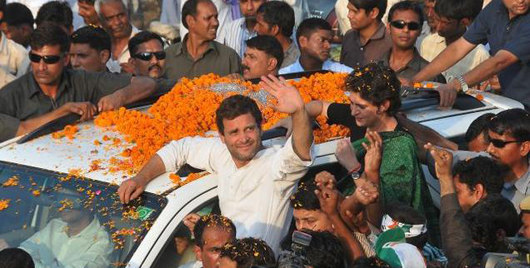
New Delhi, May 5: The high octane campaign for the penultimate phase of the Lok Sabha elections, which saw Narendra Modi embroiled in a bitter war of words with Priyanka Gandhi and Mamata Banerjee on Monday, ended in 64 constituencies, including Amethi where Rahul Gandhi is seeking re-election and 25 constituencies in Seemandhra, which will go to the polls on Wednesday.
In his campaign blitz on the last day in Uttar Pradesh, where election will be held for 15 seats on May 7, Modi invoked Lord Ram in Faizabad and stormed Amethi to campaign for BJP candidate Smriti Irani, saying people now want a "change".
The eighth phase of the polls saw Rahul’s sister Priyanka’s extensive campaign in Amethi where she attacked the BJP prime ministerial candidate while seeking votes for Congress.
Prominent candidates
Rahul’s cousin and BJP leader Varun Gandhi from neighbouring Sultanpuri, LJP President Ramvilas Paswan from Hajipur in Bihar and BJP stalwart Shanta Kumar from Kangra in Himachal Pradesh are among the nearly 900 candidates in the fray in seven States in this phase.
As many as 72 candidates are contesting in six constituencies in West Bengal where Modi raised the emotive issue of illegal immigrants, drawing a sharp reaction from Trinamool Congress chief Mamata Banerjee who called the BJP PM candidate a “paper tiger” and accused him of stoking communal fire.
Modi hit back at Banerjee, daring her to prove herself a “real tiger” by taking action against the culprits in the Saradha scam.
Pressure on Left Front
Pressure is on the Left Front in this round to retain the six seats it had won the last time as nine—time MP Basudeb Acharia, former actresses Moonmoon Sen and Sandhya Roy and singer Babul Supriyo are expected to give a tough fight.
In Bihar, where 118 candidates are contesting, former Bihar Chief Minister Lalu Prasad’s wife Rabri Devi is seeking to make her debut in the Lok Sabha from Saran, which is among the seven constituencies in the State going to the polls on May 7. Rabri is pitted against BJP leader Rajiv Pratap Rudy.
This round of elections in the Gangetic plains of Bihar will see a crucial fight in Hajipur (SC) where LJP President Ramvilas Paswan is in the fray,
Five of the seven LS seats for which election will be held on Wednesady had been won by JD(U) in 2009. Saran and Maharajganj went to RJD.
Both Himachal Pradesh and Uttarakhand are going for a single—phase election on Wednesday. While Himachal Pradesh has four seats, Uttarakhand has five. Baramulla and Ladakh in Jammu and Kashmir are also going to the polls on Wednesday.





Comments
Add new comment